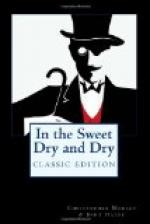As the echoes of the parade died away, public excitement was roused to fever by the discovery that evening of an infernal machine in the City Hall. Leaning against one of the great marble pillars in the lobby of the building, a gleaming object (looking very much like a four-inch shrapnel shell) was found by a vigilant patrolman. To his horror he found it to be one of the much-dreaded thermos bottles. Experts from the Bureau of Rumbustibles were summoned, and the bomb was carefully analyzed. Much to the disappointment of the chief inspector, the devilish ingredients of the explosive had been spoiled by immersion in a pail of water, so his examination was purely theoretical; but it was plain that the leading component of this hellish mixture had been nothing less than gin, animated by a fuse of lemon-peel. If the cylinder had exploded, unquestionably every occupant of the City Hall would have been intoxicated.
The conduct of the municipal officials in this crisis was extremely courageous. No one knew whether other articles of this kind might not be concealed about the building, but the Mayor and councilmen refused to go home, and even assisted in the search for possible bombs. Secret service men were called from Washington, and went into consultation with Bishop Chuff. It was a night of uproar. A reign of terror was freely predicted, and many prominent citizens sat up until after midnight on the chance of discovering similar explosives concealed about their premises.
The morning papers rallied rapidly to the cause of threatened civilization. The Daily Circumspect declared, editorially:—
The alcoholsheviks have at last thrown down the gauntlet. The news that the ginarchists have placed a ginfernal machine in the very shrine of law and order is tantamount to a declaration of war upon sobriety as a whole. A canister of forbidden design, filled with the deadliest gingredients, was found in the corridor leading to the bureau of marriage licenses in the City Hall. There must have been something more than accident in its discovery just in this spot. Men of thoughtful temper will do well to heed the symbolism of this incident. Plainly not only the constitution of the United States is to be made a quaffing-stock, but the very sanctity of the marriage bond is assailed. To this form of terrorism there is but one answer.
In the meantime, Quimbleton had disappeared. The house on Caraway Street was broken into by the police, but except for the grape arbor and a great quantity of empty bottles in the cellar, no clue was found. Apparently, however, the vanished ginarchist (for so Chuff called him) had been writing poetry before his departure. The following rather inscrutable doggerel was found scrawled on a piece of paper:—
When Death doth reap
And Chuff is sickled,
He will not keep:
He was never pickled.
For Bishop Chuff
This is ill cheer:
That Time will force him
To the bier.




